
In response to the pre-budget seminar by the opposition party PML-N, the incumbent government convened a press conference about the upcoming budget.
Finance Minister, Shaukat Tarin, Minister of Energy, Hammad Azhar, and Minister for Industries and Production, Khusro Bakhtiar, spoke on the issue and said that the government had no option but to accept the harsh conditions of the International Monetary Fund (IMF) program, to deal with the economic mess that PTI inherited.
ALSO READ
Govt is Targeting 6-7% GDP Growth in The Next 2 Years
The government’s economic team said that to achieve the tax collection target of over Rs. 7 trillion in the next two years, the revenue collection needs to go up by 20 percent every year.
The Finance Minister said that that the incumbent government had to go to the IMF because of the economic mismanagement of the previous government’s Finance Minister, Ishaq Dar.
The government will also take all necessary steps to improve development spending by 38 percent so that the country can be put back on a suitable and inclusive growth trajectory, the ministers said.
Tarin said that the present government was hopeful for the next two fiscal years and has prepared short-, medium- and long-term plans for different segments of the economy.
Reiterating the fault of the previous government, he said, “We have been paying capacity payment primarily because of the absence of planning in the power sector by the previous government.”
ALSO READ
Fawad Chaudhry Promises Huge Relief for Salaried Class in Next Budget
He informed that the tax collection will be increased to Rs. 5.8 trillion in the next fiscal year, from the current year’s level of Rs. 4.7 trillion, and this will be done by increasing the tax base through the use of technology. The retail sector will be brought into the tax net, and some exemptions will also be withdrawn in the upcoming budget, he said.
To protect the most vulnerable, the government would also adopt a bottom-up approach, Tarin said.